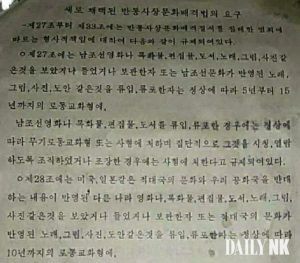With North Korea reportedly locking up people who violate quarantine protocols in political prisons, a source has claimed that these inmates will ultimately spend the rest of their lives in the camps.
In a telephone conversation with Daily NK on Monday, a source in North Korea said violations of quarantine rules might seem trivial, “but in truth, they aren’t.” He said the North Korean government treats such violations as “very bad acts violating, opposing, or failing to adhere to [COVID-19 disease control measures], which are considered to be of grave national importance.”
North Korea sends people who fail to comply with emergency quarantine regulations to political prison camps on charges of harming the national economy and violating party policy. North Korea is also building new camps as current camps reach their holding capacity, as well as expanding existing facilities.
In fact, North Korean leader Kim Jong Un has taken special interest in the quarantine issue, taking direct charge of the matter. During a June 29 meeting of the Central Committee’s politburo, Kim criticized leading cadres for creating a “grave incident” putting the safety of the state and people at risk due to lapses in quarantine efforts.
That is to say, the government considers noncompliance with quarantine regulations to be no mere violation of the law, but rather a political matter involving intentional violations of party policy. To put this another way, said the source, people who violate quarantine regulations are labeled “counterrevolutionary elements” who are directly challenging party policy.
“[The authorities] are taking the state’s declaration of the highest emergency quarantine level very seriously as they think of it as a state of semi-war,” the source explained. “Because of this, if you go into a political prison camp for violating quarantine rules, you’ll never come out.

“Short of a special order [like an amnesty] or another measure, you won’t leave the camps even as a corpse,” he continued, adding, “Literally, there is no limit to your sentence.”
Accordingly, North Korea is believed to be confining violators of quarantine rules in “total control zones.” If you enter one of these camps of lifetime imprisonment, you can never rejoin society. Inmates are subjected to brutal forced labor in mines and lumber camps before ultimately dying.
Meanwhile, in the case of violators of the recently implemented law to eradicate “reactionary thought and culture,” some are being detained in “revolutionary zones” from which release is possible. The source pointed out that the number of prisoners in these zones has recently skyrocketed.
“About 50% of the new inmates at the camps are people who have seen or distributed foreign films and dramas, agitators, people who said the wrong thing, or ideological apostates,” said the source. “Another 35% are violators of quarantine rules, and another 15% have violated existing laws.”
The source said that in the past, people who watched South Korean films or TV programs or read South Korean publications were sent to labor or reeducation camps, “but the most severe punishments such as life imprisonment or execution were rare.” The situation has “flipped 180 degrees,” however, and “so many more people are now locked up in political prison camps for watching South Korean films or TV programs.”
North Korea has been strictly applying the law on “eradicating reactionary thought and culture” since its enactment last year. The law appears aimed at boosting regime solidarity as popular disaffection accelerates due to protracted international sanctions and the closure of the border due to COVID-19.
“If you watch a South Korean TV program, the authorities consider both you and your relatives ‘ideological problems,’” said the source. “If the crime is more serious, the accused is subject to a public trial. And if a death sentence is handed down, the party committees to which the criminal or his guardians belong and even the Ministry of State Security officials in charge of the matter, are subject to party and administrative inquiries.”


















